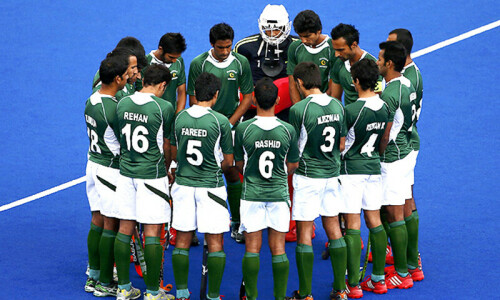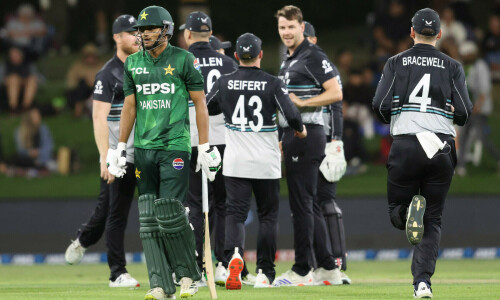
THE third Prudential World Cup at Lord’s financially proved the most bountiful of the three events played so far. The profits brought a spark in the eyes of the other cricket boards and investors summoned their accountants, marketing experts and lobbyists to prepare tenders for the 1987 event. The bids had to be in by the end of the year; and there were plenty received for the ICC to rub their hands in glee.
It is now history that India had convincingly and deservedly won the third Prudential Cup. So it was in all fairness that the 1987 World Cup be staged in the subcontinent provided of course their bid was the highest. Had a World Cup fund been floated in India and Pakistan the population would have contributed enough to outbid any bidder from anywhere.
But we have no dearth of billionaires and millionaires who if they set their minds and hearts on a feasible and viable project, would be willing to dish out the required amount. As it was the Ambanis –– Papa Dhirubhai and sons Mukesh, then 30, and Anil, two years younger, of Reliance India’s largest private sector enterprise with revenues of about $50 billion (and these figures may be outdated) came up with an offer which must have made the half a million pounds by Prudential for 1983 look like loose change! They were supported by other sponsors from both sides of the divide.
To cut a long story short the 1987 ICC World Cup was awarded to India and Pakistan and it migrated from the British Isles to two independent nations which had been their dominions only four decades ago. Cricket, as the saying goes, is a great leveller. The funds were made available but due credit must be given to Air Marshall (retd) Nur Khan and N.P.K. Salve, chairmen of Pakistan and India’s cricket boards respectively, for their perseverance and efforts in making this dream come true.
The Reliance Cup, as the fourth edition of the World Cup began to be called was a resounding success both logistically and financially. One-day cricket was gaining in strength and popularity. Since the end of the third edition to the beginning of the fourth, 217 limited-overs internationals had been played and the infection was assuming epidemic proportion. The following for this version was almost hysterical. The followers of cricket in the subcontinent regard cricket next only to religion.
There were the same teams as in 1983 divided into almost the same two groups –– New Zealand and West Indies swapping groups; as in 1983 the number of matches to be played was also 27 but spread across the entire length and breadth of the subcontinent from Madras in the South to Peshawar in the North and from Kolkata in the East to Karachi in the West.
Some teams such as the Sri Lankans spent quite a portion of their town in aircraft or in and out of hotels and cricket grounds. Because all matches were to be in daylight, white clothes and red balls were used. Since the days in the East are shorter than in England, the overs per side were reduced to 50 with each bowler allowed a maximum of 10.
During the first three World Cups all matches were supervised by English (home) umpires even when England were playing. Pakistan had been an ardent advocate of third country (I dislike using the word “neutral” as to me all umpires are fair and neutral) umpires and had in fact done so of their own accord in the series against the West Indies in 1985 when Indian umpires P.D. Reporter and V.K. Ramaswami stood in the Tests in Pakistan; and again in 1989 against India Johns Holder and Hampshire of England supervised the Test matches.
Pakistan was the pioneer in introducing third country umpires later a concept appreciated by all and later recognised and formalised by the ICC. Thus in the Reliance Cup third country umpires were invited to supervise. It was a refreshing sight watching the final between England and Australia at Eden Gardens Kolkata with 90,000 spectators and Mehboob Shah and Rambabu Gupta doing a flawless job as umpires. This was the forerunner of the Elite Panel of ICC umpires.
The fourth World Cup began and ended on an exciting note and had its high and low moments. West Indies did not even make it to the semis courtesy sportsman spirit of Courtney Walsh who refused to “Mankad” the last Pakistan man the errant Saleem Jaffer who was backing up too far; Walsh stopped in his run-up and allowed Jaffer to get back instead of removing the bails and winning the match for the West Indies. Abdul Qadir scored the winning hit and Richards and his men began booking their seats back for their home islands.
The beginning of the tournament was as exciting as the end –– Pakistan beat Sri Lanka by a mere margin of 15 in the opener at Hyderabad, Sindh; Australia defeated India in Madras by a solitary run; New Zealand scraped home against Zimbabwe by three runs; and at Gujranwala, England in a frantic run chase beat the West Indies by two wickets with half an over to spare. And Australia managed a three-run win over their Trans Tasman rivals New Zealand in the only rain-affected match at Indore (reduced to 30 overs a side).
In spite of some competent performances, some luck, great expectations, high hopes and plenty of prayers for an India-Pakistan final both lost the semis.
India were soundly thrashed by England by 35 runs at the Wankhade in Bombay. Pakistan went into the semi-finals against Australia at the Gaddafi in Lahore oozing with confidence; in fact it is reported that the Australians, not very confident because of their performance in the tournament, had not even made arrangements for the match to be televised in Australia.
Without making any excuses for what happened Pakistan were victims first of over confidence then ill luck –– injury to Salim Yousuf meant Miandad had to keep wickets which must have affected his batting; Imran got a shocker of a decision from the umpire; and to top it all one of those rare mistakes of captaincy –– Imran miscalculated the overs which meant the inexperienced Saleem Jaffer bowling the last over to a rampaging Steve Waugh who helped himself to 18 runs which coincidentally was the margin of the Australian win. Well played Australia.
Eden Gardens hosted the ‘Ashes’ World Cup final –– A v E. It was a close finish Australia going on to win their first World Cup by a meagre margin of seven runs. In fact it was the irresponsible and quite unnecessary reverse sweep attempted by the England captain Mike Gatting when his counterpart Alan border came on to bowl. But those are the glorious uncertainties of cricket. So near and yet so far –– it is after all a one-ball game. A deserved win for Australia for a great team effort. They delighted the crowd at the Eden Gardens and did a victory lap clutching the golden Reliance Cup. Will they do a West Indies and repeat this feat in 1992 when the fifth edition would be staged in Australia and New Zealand in 1992.Who knows?













































